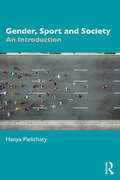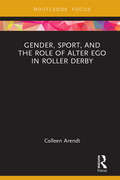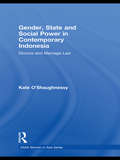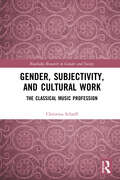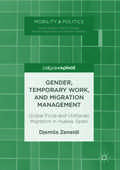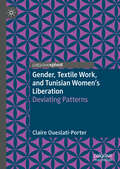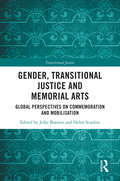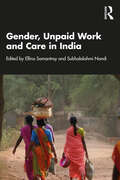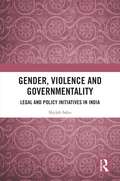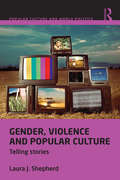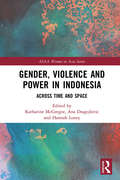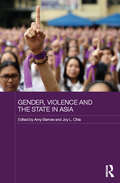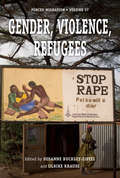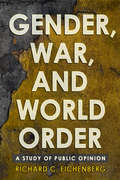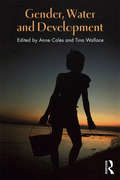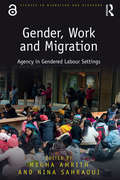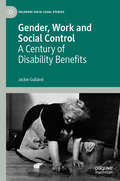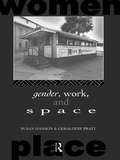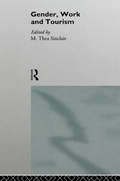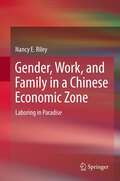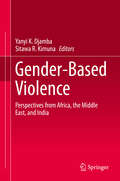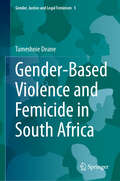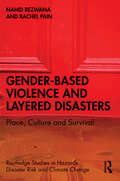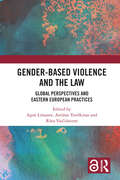- Table View
- List View
Gender, Sport and Society: An Introduction
by Hanya PielichatyIntroducing the core concepts, issues and debates in the study of gender and sport, this is an accessible, engaging and thought-provoking textbook for anyone studying or interested in sport. It highlights the complexity of the gendered sporting world. Exploring inequalities in society that are reflected in sporting spaces and practices, and offering practical guidance on how to develop study skills and critical thinking, this textbook empowers readers to view the world in a different way. The book explores the social and political aspects of gender, sport and society, as well as their intersection with race/ethnicity, dis/ability, and sexualities. Introducing the basics of gender theory as applied to sport, and placing equity, diversity and inclusion at the heart of the discussion, the book explores key themes, current issues and hot topics, such as women in esports, mental health, and parenthood. The book also looks at how gender and gender stereotypes play out in the world of sport business and management. The reader is asked to co-create the textbook’s narrative by engaging with several pedagogical features, such as ‘stop and think’ and seminar activities, requesting the reader to be an active and critical participant. The compact and considered chapters will help to break down the complexity involved in this subject area. The final chapter is dedicated to study skills and practical learning advice, acting as a study guide to complement the discipline-rich chapters that come before it. This textbook is written from practitioner-educator experience ensuring the content is degree-specific, critically positioned, and most importantly, inclusive and accessible. Full of useful features in every chapter, from subject ‘insights’ to guides on further reading, media links and other sources, as well as example assignment questions, this is an indispensable textbook for all students of gender and sport, women and sport, the sporting body, sport and society, social issues in sport, inclusion in sport, and sport development, and fascinating reading for anyone with an interest in sport, gender studies or sociology more broadly.
Gender, Sport, and the Role of Alter Ego in Roller Derby (Focus on Global Gender and Sexuality)
by Colleen ArendtGender, Sport and the Role of the Alter Ego in Roller Derby focuses on the resurgence of roller derby by examining the appeal and dedication to a sport that combines the masculine aggression and physicality of sport with a more feminine, or alternative, style of organizing and community building. No longer a scripted sport filled with fake fighting and hair pulling, derby, though still dangerous, has nevertheless exploded in popularity around the world. Drawing on data from in-depth interviews with women players, Colleen Arendt reveals how derby has come to serve as a site of gender rebellion and emancipation that empowers participants. She demonstrates how players find roller derby a place to build friendships and support networks, while giving back to their community. The book also analyzes the adoption of derby personas, or alter egos, which many players use. While many players derive joy and other benefits from their derby personas, others argue that personas and alter egos detract from the athleticism and legitimacy of the sport. Finally, by considering the relationship between gender, sport, society, and power, this book tries to answer the question: Why derby? Why now?
Gender, State and Social Power in Contemporary Indonesia: Divorce and Marriage Law (ASAA Women in Asia Series)
by Kate O'ShaughnessyThis book examines gender, state and social power in Indonesia, focusing in particular on state regulation of divorce from 1965 to 2005 and its impact on women. Indonesia experienced high divorce rates in the 1950s and 1960s, followed by a remarkable decline. Already falling divorce rates were reinforced by the 1974 Marriage Law, which for the first time regulated marriage for both Muslim and non-Muslim Indonesians and restricted access to divorce. This law defined the roles of men and women in Indonesian society, vesting household leadership with husbands and the management of the household with wives. Drawing on a wide selection of primary sources, including court records, legal codes, newspaper reports, fiction, interviews and case studies, this book provides a detailed historical account of this period of important social change, exploring fully the impact and operation of state regulation of divorce, including the New Order government’s aims in enacting this legal framework, its effects in practice and how it was utilised by citizens (both men and women) to advance their own agendas. It argues that the Marriage Law was a tool of social control enacted by the New Order government in response to the social upheaval and protests experienced in the mid 1970s. However, it also shows that state power was not hegemonic: it was both contested and co-opted by citizens, with men and women enjoying different degrees of autonomy from the state. This book explores all of these issues, providing important insights on the nature of the New Order regime, social power and gender relations, both during the years of its rule and since its collapse.
Gender, Subjectivity, and Cultural Work: The Classical Music Profession (Routledge Research in Gender and Society)
by Christina ScharffWhat is it like to work as a classical musician today? How can we explain ongoing gender, racial, and class inequalities in the classical music profession? What happens when musicians become entrepreneurial and think of themselves as a product that needs to be sold and marketed? Gender, Subjectivity, and Cultural Work explores these and other questions by drawing on innovative, empirical research on the working lives of classical musicians in Germany and the UK. Indeed, Scharff examines a range of timely issues such as the gender, racial, and class inequalities that characterise the cultural and creative industries; the ways in which entrepreneurialism – as an ethos to work on and improve the self – is lived out; and the subjective experiences of precarious work in so-called ‘creative cities’. Thus, this book not only adds to our understanding of the working lives of artists and creatives, but also makes broader contributions by exploring how precarity, neoliberalism, and inequalities shape subjective experiences. Contributing to a range of contemporary debates around cultural work, Gender, Subjectivity, and Cultural Work will be of interest to scholars and students in the fields of Sociology, Gender and Cultural Studies.
Gender, Temporary Work, and Migration Management
by Djemila ZeneidiThis book delves into migration management via an original case study of a guest worker programme involving the circular migration to Spain of female Moroccan agricultural workers destined for the strawberry agri-food industry in the south. To ensure that they do return to Morocco, mothers of young children are first earmarked and then selected on the basis of their poor, rural origins and the supposed "delicacy of their hands". This book analyses the mechanisms through which migration and workforces are controlled, while also addressing the paradoxical experience of these female seasonal workers, at the intersection of domination and emancipation.
Gender, Textile Work, and Tunisian Women’s Liberation: Deviating Patterns
by Claire Oueslati-PorterThis book presents ethnographic research conducted in an export zone textile factory in Binzart, Tunisia during the years leading up to the Arab Spring. The author focuses on the sexist management tactics in the factory, as well as women workers’ patterns of resistance and capitulation to sexual objectification and exploitation. Masculinity as enacted by men and by some women is revealed as fundamental to the processes of production. Certain women workers, Oueslati-Porter shows, challenge cisgender norms by appropriating masculinity for themselves, threatening men’s masculine supremacy. Furthermore, socio-cultural surveillance mechanisms in the factory and in the family is curtail the tensions posed by the presence of masculine women.Gender, Textile Work, and Tunisian Women’s Liberation will be of interest to students andscholars of anthropology, sociology, women’s, gender, and sexuality studies, LGBTQ+ studies,and Middle East and North Africa studies.
Gender, Transitional Justice and Memorial Arts: Global Perspectives on Commemoration and Mobilization
by Jelke Boesten and Helen ScanlonThis book examines the role of post-conflict memorial arts in bringing about gender justice in transitional societies. Art and post-violence memorialisation are currently widely debated. Scholars of human rights and of commemorative arts discuss the aesthetics and politics not only of sites of commemoration, but of literature, poetry, visual arts and increasingly, film and comics. Art, memory and activism are also increasingly intertwined. But within the literature around post-conflict transitional justice and critical human rights studies, there is little questioning about what memorial arts do for gender justice, how women and men are included and represented, and how this intertwines with other questions of identity and representation, such as race and ethnicity. The book brings together research from scholars around the world who are interested in the gendered dimensions of memory-making in transitional societies. Addressing a global range of cases, including genocide, authoritarianism, civil war, electoral violence and apartheid, they consider not only the gendered commemoration of past violence, but also the possibility of producing counter-narratives that unsettle and challenge established stereotypes. Aimed at those interested in the fields of transitional justice, memory studies, post-conflict peacebuilding, human rights and gender studies, this book will appeal to academics, researchers and practitioners.
Gender, Unpaid Work and Care in India
by Ellina Samantroy and Subhalakshmi NandiThis book explores the paradox of women’s paid and unpaid work in India. It examines key themes including historical discourses, macroeconomic policies, employment trends, issues of tribal areas, public services and infrastructure, climate change and gendered migration and vulnerability of girl children. It highlights the play of gender norms, resource rights, identities and agency in women’s work. Building on feminist theoretical frameworks and empirical analyses from microstudies, the volume offers fresh perspectives for research and policy on women’s work in the Global South. A timely intervention, this multidisciplinary book will be useful to scholars and researchers of political economy, labour studies, women’s/gender studies, public policy, economics, development studies, sociology, South Asian studies and Global South studies. It will interest planners, policymakers, gender advocates, civil society organisations, human rights bodies and international organisations working towards ensuring gender equality and women’s rights.
Gender, Violence and Governmentality: Legal and Policy Initiatives in India
by Skylab SahuThis book critically examines gender-based violence in India and interrogates the legal and policy discourse surrounding it. It discusses various forms of violence faced by women such as sex selective abortion, trafficking, rape, domestic violence, as well as the violence faced by female sex workers and transgenders in India. It draws on in-depth interviews and case studies to highlight the socio-economic conditions of the survivors who find themselves forced to contend with legal and policy framework that is inadequate to deal with these issues. The author analyses the major laws against violence and the policies introduced to ameliorate the condition of survivors in order to understand the potential and challenges of these initiatives from a postmodern and feminist perspective. The book also addresses the survivors’ realisation of agency and resistance which is seen to be expressed both sporadically and on day-to-day basis. An important and timely contribution, this book will be indispensable to students and researchers of gender and sexuality, feminism, minority studies, sociology and social policy, politics, law, human rights and South Asian studies. It will also be of interest to policymakers, government agencies, think tanks and NGOs working in the area.
Gender, Violence and Popular Culture: Telling Stories (Popular Culture and World Politics)
by Laura J. ShepherdThis book examines the intersection of gender and violence in popular culture. Drawing on the latest thinking in critical international relations, media and cultural studies and gender studies, it focuses in particular on a number of popular TV shows including Angel, Buffy the Vampire Slayer, Firefly, Generation Kill, The Corner and The West Wing. The book makes a unique theoretical contribution to the ‘narrative turn’ in International Relations by illustrating the ways in which popular culture and global politics are intertwined and how we make sense of our worlds through these two frames. Methodologically, the book enhances discourse-theoretical analysis in IR through its incorporation of methods from narratology and film studies. The book proposes an aesthetic ethicopolitical approach to global politics which challenges us to interrogate how it becomes possible that we think what we think, it challenges the truths that we hold to be self-evident and that which we take to be common sense. It demands that we think carefully, critically, uncomfortably, about our world(s) – even when we’re ‘only’ watching television.
Gender, Violence and Power in Indonesia: Across Time and Space (ASAA Women in Asia Series)
by Katharine McGregor Ana Dragojlovic Hannah LoneyThis book uses an interdisciplinary approach to chart how various forms of violence – domestic, military, legal and political – are not separate instances of violence, but rather embedded in structural inequalities brought about by colonialism, occupation and state violence. The book explores both case studies of individuals and of groups to examine experiences of violence within the context of gender and structures of power in modern Indonesian history and Indonesia-related diasporas. It argues that gendered violence is particularly important to consider in this region because of its complex history of armed conflict and authoritarian rule, the diversity of people that have been affected by violence, as well as the complexity of the religious and cultural communities involved. The book focuses in particular on textual narratives of violence, visualisations of violence, commemorations of violence and the politics of care.
Gender, Violence and the State in Asia (Routledge Research on Gender in Asia Series)
by Amy Barrow and Joy L. ChiaWhile gender-based violence occurs in all societies irrespective of the level of development or cultural setting, whether in conflict or peacetime, the challenges for legal responses to gender-based violence are particularly acute in Asia. This book addresses the lack of academic discourse on gender-based violence in Asia beyond domestic violence, by demonstrating that gendered violence exists within many different contexts and is perpetuated by multiple actors. Bringing together scholars, legal practitioners and human rights advocates, the book examines the intersections between gender, violence and the state in Asian contexts. It considers the role of state institutions in perpetuating and preventing violence based on gender and identity, and thus contributes to growing scholarship around due diligence standards under international law. Analyzing both physical and structural gender-based violence, it scrutinizes how such violence exists within a landscape shaped by distinct cultural norms, laws and policies, and grapples with how to practically translate international human rights standards about state responsibility into these complex domestic environments. Contributors from diverse backgrounds draw on case studies and empirical research to ground this academic scholarship in lived experiences of individuals and their communities in Asia. By bridging the divide between policy, laws and practice to offer a unique insight into both theoretical and practical responses to how gender-based violence is understood within communities and state institutions in Asian countries, this book will appeal to students and scholars of Asian studies, Gender Studies and Law.
Gender, Violence, Refugees (Forced Migration #37)
by Susanne Buckley-Zistel Ulrike KrauseProviding nuanced accounts of how the social identities of men and women, the context of displacement and the experience or manifestation of violence interact, this collection offers conceptual analyses and in-depth case studies to illustrate how gender relations are affected by displacement, encampment and return. The essays show how these factors lead to various forms of direct, indirect and structural violence. This ranges from discussions of norms reflected in policy documents and practise, the relationship between relief structures and living conditions in camps, to forced military recruitment and forced return, and covers countries in Africa, Asia and Europe.
Gender, War, and World Order: A Study of Public Opinion (Cornell Studies in Security Affairs)
by Richard C. EichenbergMotivated by the lack of scholarly understanding of the substantial gender difference in attitudes toward the use of military force, Richard C. Eichenberg has mined a massive data set of public opinion surveys to draw new and important conclusions. By analyzing hundreds of such surveys across more than sixty countries, Gender, War, and World Order offers researchers raw data, multiple hypotheses, and three major findings.Eichenberg poses three questions of the data: Are there significant differences in the opinions of men and women on issues of national security? What differences can be discerned across issues, culture, and time? And what are the theoretical and political implications of these attitudinal differences? Within this framework, Gender, War, and World Order compares gender difference on military power, balance of power, alliances, international institutions, the acceptability of war, defense spending, defense/welfare compromises, and torture. Eichenberg concludes that the centrality of military force, violence, and war is the single most important variable affecting gender difference; that the magnitude of gender difference on security issues correlates with the economic development and level of gender equality in a society; and that the country with the most consistent gender polarization across the widest range of issues is the United States.
Gender, Water and Development (Cross-Cultural Perspectives on Women)
by Anne ColesThere is a renewed global commitment to 'water for all'. Yet even though women are usually responsible for domestic water provision, their needs and voices continue to be marginalized in the development process. A close analysis of current policy and practice shows that organizations providing improved water supplies to poor communities typically neglect the gendered nature of access to and control over water resources. The resulting gender bias causes inefficiencies and injustices in water provision and reduces the effectiveness of well-meant efforts. This book shows how, in different environmental, historical and cultural contexts, gender has been an important element in water provision. It draws on a wide range of first-hand material, analyzed from different disciplinary perspectives. Case studies include analysis of the role of water in inhibiting the fight against HIV/AIDS in southern Africa, and the challenges of taking gender into account in large water projects in India and Nepal.
Gender, Work and Migration: Agency in Gendered Labour Settings (Studies in Migration and Diaspora)
by Megha Amrith Nina SahraouiWhile the feminisation of transnational migrant labour is now a firmly ingrained feature of the contemporary global economy, the specific experiences and understandings of labour in a range of gendered sectors of global and regional labour markets still require comparative and ethnographic attention. This book adopts a particular focus on migrants employed in sectors of the economy that are typically regarded as marginal or precarious – domestic work and care work in private homes and institutional settings, cleaning work in hospitals, call centre labour, informal trade – with the goal of understanding the aspirations and mobilities of migrants and their families across generations in relation to questions of gender and labour. Bringing together rich, fieldwork-based case studies on the experiences of migrants from the Philippines, Bolivia, Ecuador, Zimbabwe, Mozambique, Mauritius, Brazil and India, among others, who live and work in countries within Europe, Asia, the Middle East and South America, Gender, Work and Migration goes beyond a unique focus on migration to explore the implications of gendered labour patterns for migrants’ empowerment and experiences of social mobility and immobility, their transnational involvement, and wider familial and social relationships.
Gender, Work and Social Control: A Century of Disability Benefits (Palgrave Socio-Legal Studies)
by Jackie GullandThis book uses previously unknown archive materials to explore the meaning of the term ‘incapable of work’ over a hundred years (1911–present). Nowadays, people claiming disability benefits must undergo medical tests to assess whether or not they are capable of work. Media reports and high profile campaigns highlight the problems with this system and question whether the process is fair. These debates are not new and, in this book, Jackie Gulland looks at similar questions about how to assess people’s capacity for work from the beginning of the welfare state in the early 20th century. Amongst many subject areas, she explores women’s roles in the domestic sphere and how these were used to consider their capacity for work in the labour market. The book concludes that incapacity benefit decision making is really about work: what work is, what it is not, who should do it, who should be compensated when work does not provide a sufficient income and who should be exempted from any requirement to look for it.
Gender, Work and Space (Routledge International Studies of Women and Place)
by Susan Hanson Geraldine PrattGender, Work and Space explores how social boundaries are constructed between women and men, and among women living in different places. Focusing on work, the segregation of men and women into different occupations, and variations in women's work experiences in different parts of the city, the authors argue that these differences are grounded, constituted in and through, space, place, and situated social networks.The sheer range and depth of this extraordinary study throws new light on the construction of social, geographic, economic, and symbolic boundaries in ordinary lives.
Gender, Work and Tourism
by M. Thea SinclairGender, Work and Tourism examines the central role played by women in the tourism industry. It discusses the nature of their work and the ways in which tourism creates tensions between the attitude and conduct of tourists and the beliefs and behaviour of local women. Among the areas explored are: the segmentation of tourism work in Northern Cyprus; women's and men's work in Bali and the division of social and political power; gendered tourism work in Mexico and the Philippines; material and ideological changes in sex tourism in South-East Asia and the exploitation of South-East Asian women in Japan.
Gender, Work, and Family in a Chinese Economic Zone
by Nancy E RileyThis book examines the dynamics of power within the families of married women who have migrated from rural areas to China's Dalian Economic Zone. Engaging the question of whether waged work gives women power in their families, this ethnographic study finds that women do indeed use their new positions and urban status to negotiate their family status. However, women use these new resources not necessarily to promote their own individual liberation, but rather to strengthen their contribution as wives and, especially, as mothers. Thus, this new modernity provides a space for the re-inscribing of traditional roles, even as it may work to give women new-found power within their families. How and why this process occurs is related to the dual inequalities these women face as rural migrants and as women.
Gender-Based Violence
by Yanyi K. Djamba Sitawa R. KimunaThis book offers new perspectives on gender-based violence in three regions where the subject has been taboo in everyday discourse often due to patriarchal cultural norms that limit women's autonomy. The contributions to this book provide rare insight into not only the levels and the socio-demographic determinants of domestic violence, but topics ranging from men's attitudes toward wife beating; domestic violence-related adolescent deaths, and women's health problems due to sexual and physical abuse. With a comprehensive introduction that provides a comparative international research framework for discussing gender-based violence in these three unique regions, this volume provides a key basis for understanding gender-based violence on a more global level. Part I, on Africa, covers men's attitudes towards domestic violence, the impact of poverty and fertility, the association between adolescent deaths and domestic violence, and the link between domestic abuse and HIV. Part II, on the Middle East, covers the importance of consanguinity on domestic violence in Egypt and Jordan, the effects of physical abuse on reproductive health, and the link between political unrests and women's experience and attitudes towards domestic violence. Part III, on India, shows how sexual abuse puts women at risk of reproductive tract infections and sexually transmitted infections, as well as the role of gender norms in wife abuse and the role of youth aggressive behavior in nonconsensual sex. With such a deep and broad coverage of factors of intimate partner abuse, this book serves as a reference document for researchers, decision-makers, and organizations that are searching for ways to reduce gender-based domestic violence. This book is of interest for researchers in Criminology and Criminal Justice, as well as Sociology, Social Work, Public Health and Human Rights.
Gender-Based Violence and Femicide in South Africa (Gender, Justice and Legal Feminism #5)
by Tameshnie DeaneThis book presents new perspectives on gender-based violence (GBV) in South Africa. It argues that violence against women is a manifestation of unequal gender relations and harmful manifestations of hegemonic masculinity, which are governed by patriarchal beliefs, institutions and systems. It includes chapters on quantitative research that assess not only the levels and determinants of violence against women but also men’s attitudes towards gender-based violence, perceptions of violence, the legislative frameworks governing violence against women in South Africa, and the current cases and jurisprudence relating to this scourge. In spite of its focus on South Africa, the book also provides insights for comparative scholars exploring the value of different constitutional articulations of human rights and how they support (or fail to support) efforts to combat violence against women. By assessing recent incidents and responses to gender-based violence, the book provides a view of not only the societal but also jurisprudential opportunities and pitfalls in this area that may be applicable elsewhere. Gender equality and, central to this, the right of women to live lives free of violence, is a precondition for full democratic participation and is a universal goal. Accordingly, the South African experience contributes to a wider understanding of the possibilities and limitations of societal and legal reform in challenging the ubiquity of violence against women. The book is aimed at researchers, practitioners, students, professionals and advocates in the field of gender-based violence.
Gender-Based Violence and Layered Disasters: Place, Culture and Survival (Routledge Studies in Hazards, Disaster Risk and Climate Change)
by Rachel Pain Nahid RezwanaThis book investigates the widespread and persistent relationship between disasters and gender-based violence, drawing on new research with victim-survivors to show how the two forms of harm constitute ‘layered disasters’ in particular places, intensifying and reproducing one another. The evidence is now overwhelming that disasters and gender-based violence are closely connected, not just in moments of crisis but in the years that follow as the social, economic and environmental impacts of disasters play out. This book addresses two key gaps in research. First, it examines what causes the relationship between disasters and gender-based violence to be so widespread and so enduring. Second, it highlights victim-survivors’ own accounts of gender-based violence and disasters. It does so by presenting findings from original research on cyclones and flooding in Bangladesh and the UK and a review of global evidence on the Covid-19 pandemic. Drawing on feminist theories, it conceptualises the coincidence of gender-based violence, disasters and other aggravating factors in particular places as ‘layered disasters.’ Taking an intersectional approach that emphasises the connections between culture, place, patriarchy, racism, poverty, settler-colonialism, environmental degradation and climate change, the authors show the significance of gender-based violence in creating vulnerability to future disasters. Forefronting victim-survivors’ experiences and understandings, the book explores the important role of trauma, and how those affected go about the process of survival and recovery. Understanding disasters as layered casts light on why tackling gender-based violence must be a key priority in disaster planning, management and recovery. The book concludes by exploring critiques of existing formal responses, which often ignore or underplay gender-based violence. The book will be of interest to all those interested in understanding the causes and impacts of disasters, as well as scholars and researchers of gender and gender-based violence.
Gender-Based Violence and the Law: Global Perspectives and Eastern European Practices
by Agnė Limantė Artūras Tereškinas Rūta VaičiūnienėThis book presents a novel and insightful examination of gender-based violence, inviting readers to consider this topic from various perspectives. It encompasses various conceptual discussions and international regulations and trends, while concurrently emphasising the legal regulations and practices of select Central and Eastern European countries. Significantly underrepresented in legal scholarship, this region has been overlooked and subject to limited comprehensive analyses. The authors address different aspects of gender-based violence, also covering some areas that have received little attention in academic literature, such as gender-based violence in academia and cyberstalking. Furthermore, the book incorporates recent empirical studies, thereby endowing readers with valuable insights into the specific challenges encountered in the region. By contributing to current research on gender-based violence in Europe, this publication is an invaluable resource for researchers, students, policymakers, and general readers interested in gender-based violence and the fight against it in the Central and Eastern European region.
Gender-Based Violence and the Law: Global Perspectives and Eastern European Practices
by Agnė Limantė Artūras Tereškinas Rūta VaičiūnienėThis book presents a novel and insightful examination of gender-based violence, inviting readers to consider this topic from various perspectives. It encompasses various conceptual discussions and international regulations and trends, while concurrently emphasising the legal regulations and practices of select Central and Eastern European countries. Significantly underrepresented in legal scholarship, this region has been overlooked and subject to limited comprehensive analyses. The authors address different aspects of gender-based violence, also covering some areas that have received little attention in academic literature, such as gender-based violence in academia and cyberstalking. Furthermore, the book incorporates recent empirical studies, thereby endowing readers with valuable insights into the specific challenges encountered in the region. By contributing to current research on gender-based violence in Europe, this publication is an invaluable resource for researchers, students, policymakers, and general readers interested in gender-based violence and the fight against it in the Central and Eastern European region.
